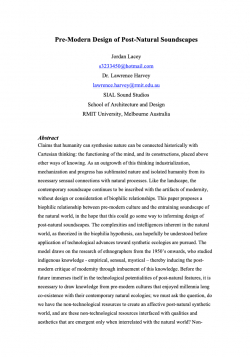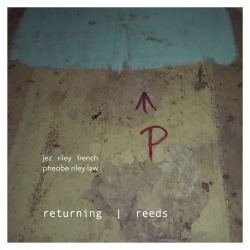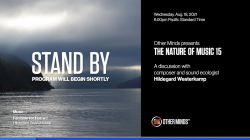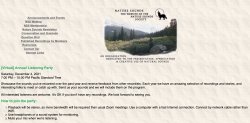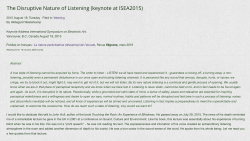To undo nature; on refusal as return
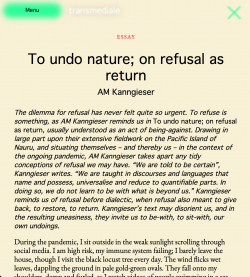
Type
Publication
Authors
Kanngieser ( AM Kanngieser )
Category
Essay
[ Browse Items ]
Publication Year
2021
Publisher
Transmediale, Germany
URL
[ private ]
Tags
Abstract
The dilemma for refusal has never felt quite so urgent. To refuse is something, as AM Kanngieser reminds us in To undo nature; on refusal as return, usually understood as an act of being-against. Drawing in large part upon their extensive fieldwork on the Pacific Island of Nauru, and situating themselves – and thereby us – in the context of the ongoing pandemic, AM Kanngieser takes apart any tidy conceptions of refusal we may have. “We are told to be certain”, Kanngieser writes. “We are taught in discourses and languages that name and possess, universalise and reduce to quantifiable parts. In doing so, we do not learn to be with what is beyond us.” Kanngieser reminds us of refusal before dialectic, when refusal also meant to give back, to restore, to return. Kanngieser’s text may disorient us, and in the resulting uneasiness, they invite us to be-with, to sit-with, our own undoings.
"During the pandemic, I sit outside in the weak sunlight scrolling through social media. I am high risk, my immune system failing; I barely leave the house, though I visit the black locust tree every day. The wind flicks wet leaves, dappling the ground in pale gold-green ovals. They fall onto my shoulders, damp and furled, as I watch videos of people swimming in a sea, far away. Friends post photos of flowers they find while strolling around their neighbourhood. For a moment, an iris’s bloom bursts online. My feed drifts along with clouds, sunsets, lightning storms. There is a yearning for forest hikes and long walks around the lake. Almost everyone I speak to says they miss being in nature. Sales of houseplants skyrocket and people take up gardening. I plant seeds. It’s therapeutic, we are told. My monstera plant grows and grows, unconstrained. I hear its branches creak at night.
I think a lot about water, in this time. As I immerse seedlings, just barely emerging from the dirt, I think about what is carried in its flow. Whisperings of rivers that greet the sea. The currents that pull between oceans, deep below. The saltiness of estuaries that ebb through the roots of mangroves. Waters that return to themselves, always different, streaming off, merging back, sinking in. My partner tells me: you never step in the same river twice. Someone suggests I read about Oceanus, the Greek titan of water, the son of Uranus, the god of the sky, and Gaia, the goddess of the earth. Oceanus ruled the River Okeanos, which encircled the flattened globe. His river begat the eternal flow of time. I think of what it means, to come from water, that nebulous tide. Like the River Okeanos, the word nature also means to birth, to beget. For thousands of years, nature has been linked to an innate essence of life, of body, of the universe, of the human. It is a force woven through the world itself, coiling tighter.
Among those damp gold-green ovals I register the stillness of the impending night. I consider what has been done to reduce all of this expansive, incommensurable earth to nature as we know it. I know what this nature is, and I know who this nature serves. As I breathe in the cool air, I realise that I cannot help but refuse it.
To refuse is usually understood as being-against: the Bartleby-an preference not to; refusal as strike, occupation, boycott, cancellation, retaliation, resistance, from passive evasions to spectacles of revolution.[1] The no of refusal is a mode of survival: an impenetrable boundary, silent or shouted. It is a refusal to be killed or to succumb: the Indigenous refusal of colonial recognition, the Black refusal of white erasure and enclosure.[2] But before refusal as dialectic, in the now unused meaning found in common Latin, refusal also meant to give back, to restore, to return. Derived from re-, “back”, and fundere-, “to pour”, this meaning fell out of use, likely because conversational Latin was not transcribed but comprised of evolving and divergent dialects and sociolects. The only way that common or vernacular Latin came to be known was as exemplified error, as linguistic breaches or mistakes.
The addition of refusal as return – a definition always already slipping away, consigned to hearsay and archival traces – disarranges refusal’s march towards the future, seeking action, reaction, momentum. An understanding of refusal as return – a (re)turning to an (un)known because nothing ever returned to its self-same or absolute – unsettles narratives of resistance that are framed only in opposition. The idea of pouring back or watering expands the conceptualisation of refusal as an act of liberation. Refusal as return swells refusal’s imagination-otherwise, loosening it and diffusing it. There is something compelling about pouring water back, the way it flows and circulates in its dissipation. Water as reverence, libation, in memory of. Water as sustenance, poured as a gesture of nourishment and love. Water thrown out, released, a dam burst, a flooding rain scattered across the ground (“to scatter” is also contained within fundere); water returning to its mutable source. In this watery return lies a desire for restitution, even if it comes through dispossession, violence, and death..."
"During the pandemic, I sit outside in the weak sunlight scrolling through social media. I am high risk, my immune system failing; I barely leave the house, though I visit the black locust tree every day. The wind flicks wet leaves, dappling the ground in pale gold-green ovals. They fall onto my shoulders, damp and furled, as I watch videos of people swimming in a sea, far away. Friends post photos of flowers they find while strolling around their neighbourhood. For a moment, an iris’s bloom bursts online. My feed drifts along with clouds, sunsets, lightning storms. There is a yearning for forest hikes and long walks around the lake. Almost everyone I speak to says they miss being in nature. Sales of houseplants skyrocket and people take up gardening. I plant seeds. It’s therapeutic, we are told. My monstera plant grows and grows, unconstrained. I hear its branches creak at night.
I think a lot about water, in this time. As I immerse seedlings, just barely emerging from the dirt, I think about what is carried in its flow. Whisperings of rivers that greet the sea. The currents that pull between oceans, deep below. The saltiness of estuaries that ebb through the roots of mangroves. Waters that return to themselves, always different, streaming off, merging back, sinking in. My partner tells me: you never step in the same river twice. Someone suggests I read about Oceanus, the Greek titan of water, the son of Uranus, the god of the sky, and Gaia, the goddess of the earth. Oceanus ruled the River Okeanos, which encircled the flattened globe. His river begat the eternal flow of time. I think of what it means, to come from water, that nebulous tide. Like the River Okeanos, the word nature also means to birth, to beget. For thousands of years, nature has been linked to an innate essence of life, of body, of the universe, of the human. It is a force woven through the world itself, coiling tighter.
Among those damp gold-green ovals I register the stillness of the impending night. I consider what has been done to reduce all of this expansive, incommensurable earth to nature as we know it. I know what this nature is, and I know who this nature serves. As I breathe in the cool air, I realise that I cannot help but refuse it.
To refuse is usually understood as being-against: the Bartleby-an preference not to; refusal as strike, occupation, boycott, cancellation, retaliation, resistance, from passive evasions to spectacles of revolution.[1] The no of refusal is a mode of survival: an impenetrable boundary, silent or shouted. It is a refusal to be killed or to succumb: the Indigenous refusal of colonial recognition, the Black refusal of white erasure and enclosure.[2] But before refusal as dialectic, in the now unused meaning found in common Latin, refusal also meant to give back, to restore, to return. Derived from re-, “back”, and fundere-, “to pour”, this meaning fell out of use, likely because conversational Latin was not transcribed but comprised of evolving and divergent dialects and sociolects. The only way that common or vernacular Latin came to be known was as exemplified error, as linguistic breaches or mistakes.
The addition of refusal as return – a definition always already slipping away, consigned to hearsay and archival traces – disarranges refusal’s march towards the future, seeking action, reaction, momentum. An understanding of refusal as return – a (re)turning to an (un)known because nothing ever returned to its self-same or absolute – unsettles narratives of resistance that are framed only in opposition. The idea of pouring back or watering expands the conceptualisation of refusal as an act of liberation. Refusal as return swells refusal’s imagination-otherwise, loosening it and diffusing it. There is something compelling about pouring water back, the way it flows and circulates in its dissipation. Water as reverence, libation, in memory of. Water as sustenance, poured as a gesture of nourishment and love. Water thrown out, released, a dam burst, a flooding rain scattered across the ground (“to scatter” is also contained within fundere); water returning to its mutable source. In this watery return lies a desire for restitution, even if it comes through dispossession, violence, and death..."
Description
https://transmediale.de/almanac/to-undo-nature-on-refusal-as-return
Number of Copies
1
| Library | Accession No | Call No | Copy No | Edition | Location | Availability |
|---|---|---|---|---|---|---|
| Main | 236 | 1 | Yes |
